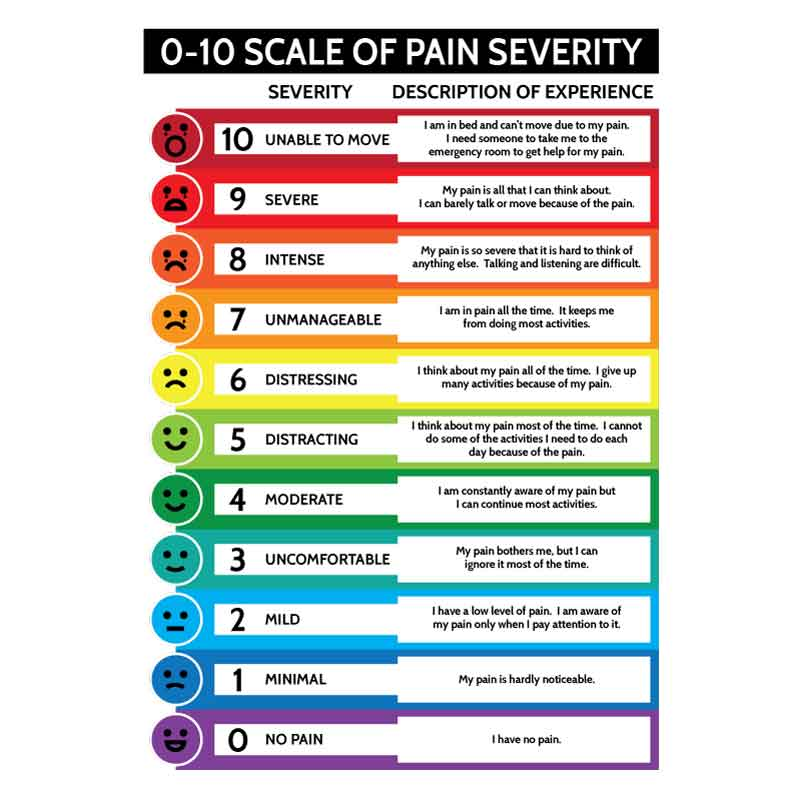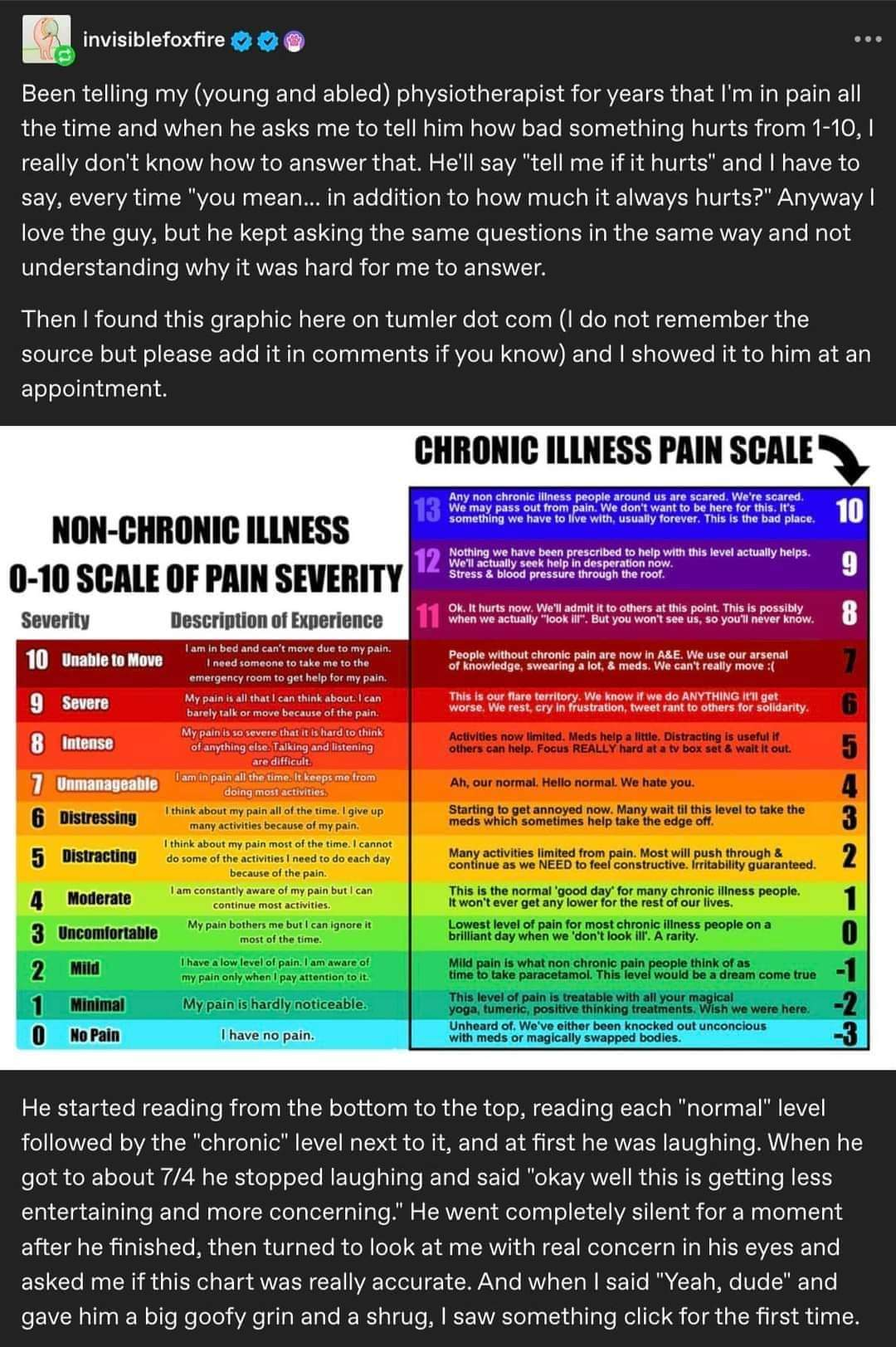
Why they never show this scale when asking about pain, I don't know.
A community for memes and humorous images that may be appreciated by autistic people, not necessarily autism-related memes.
Instance description for federated visitors

Why they never show this scale when asking about pain, I don't know.
Because the faces have no consistency lmao, pain rated at 5 shouldn't look happier than rank 1
I was gonna say, 5-1 look flipped. "Yay, my constant pain is making me unable to live my life!"

Why not? Rank 1 pain is just boring. 2 and 3 is where it gets more fun! /hj
Temporary pain can be fun (like leg cramps <3), but if it's uncontrolled and continues for a long time it can be annoying. Definitely agree that the smiley choices on that sign seem a wee bit too masochistic to be making these signs for general use...
This one is a bit better for chronic pain.

My partner has chronic pain. I'm stealing this as a tool for future conversations. Thank you!
What the fuck, man, why is this so accurate? Reading the meme, I thought I'd rate my normal pain as a 4. Then I read the non-chronic pain scale and realized the description matches a 7, which is exactly where this chronic pain scale maps it.
Judging by the smileys:
1-3 are normal people, 5 is a chronic patient
Too true.
When I was in an ambulance for an injury, the EMT asked me to rate my pain from 1 to 10. I said I didn't know, because I have no frame of reference (because the whole concept of trying to rate pain objectively is stupid, but I didn't say that).
He said just rate it anyway. I said 4. He said, "okay, there's no way it's 4" and dropped it.
Based on these descriptions, it was way higher than 4.
It's not about having an obective answer to your pain levels, that's impossible since everybody experiences pain differently.
I worked in the hospital for some time and it was my task to protocol those pain tables every day.
At least where I worked the point of it was to have visualisation of the patients pain development over time.
For example patients comes in and gives a 8 on the scale. He gets an operation and gives a 6 afterwards, after a week he gives a 5 but in the next week he gives 7 again - this development could tell us something about the healing process, maybe there's an infection that would've slipped by if we didn't see this unusual rise in pain levels.
Still seems dumb to dismiss a patient's self-assessment like he did.
Yeah I wasn't answering to your anecdote, just trying to illuminate the purpose of those charts and that their rating is inherently subjective.
Obviously being dismissive about it is not productive.
Although there were times where we asked patients to reassess them, almost always when their answers were in the high end of the scale, a dude sitting totally chill drinking tea answering '10' is not really believable and could cloud what's happening. I mostly described it as "1 being a mild inconvenience and 10 being the strongest pain you have ever felt in your life"
Because they want to get under those 3 minutes per patient limit.
But for real - if you want to quality things a scale is needed. Otherwise might as well use any description, including showing with your hands "how much".
Thats why I describe the scale to the doctor, eg 'with 10 being fainting from pain, 9 being unable to function or willing to die, etc etc ... my sudden short term pain is at a 6'.
Honestly it would be quite hard for me to distinguish between 4 and 8, depending on how distracted I am. And also it doesn't distinguish between constant pain and pain that flares up.
Anything above 7 is excluded if it's not constant pain. You might have an episode that would register as a 10, but can't be logged as anything larger than 7 because it's not "all the time".
I'd say it's imperfect, because it is too vague and too restrictive at the same time.
Many of those descriptions require you to have had the pain for many days.
How should I know how much the pain would impact my daily life after an accident?
according to this I have never experienced anything higher than 4
The problem with this scale is that the patient is left reading each number and then deciding based on the description, which may not necessarily reflect the pain they feel.
What WOULD reflect the pain they feel? My own arbitrary scale pegs 10 as the worst pain imaginable, and I can imagine some pretty terrible pain. If I'm not given any frame of reference, the highest I'd rate any pain I've been in, from horrible toothaches to broken bones, no higher than, like, 3. At least this has something tying that number to something else.
I see a number scale like this only really useful for tracking an individual as they progress. In which case, I'd say it'd probably be best to start at 5, "okay sir/madam, right now whatever pain you're feeling, were going to call that a 5. As we progress through your treatment, I want you to remember this pain, as 5, and tell me at given times if it's better, or worse, or the same on a scale of 1-10."
Assessing initial pain is a lot trickier, precisely because you don't have an agreed upon scale. Also, people are WILDLY different with regards to pain. I have a really high pain tolerance, as long as I know why I'm in pain. The thing that bothers me more is not knowing what's causing a pain, Whether it's actively killing me or just trying to make me miserable. Should I include that worry in my pain scale? Or use whatever scale I want to? Or just agree upon a scale and run with it?
I work in healthcare. This is on the wall in most pain management exam rooms and hospital suites.
This would have helped me recently when I had started using improper heel support insoles for plantar fasciitis. It caused so much pain in my thighs, quads and buttocks due to the weird muscles I was using that every night I would lay in bed on the verge of weeping due to the extreme pain. Felt like every nerve from my feet to my hips were screaming in absolute agony. Somehow I'd wake up each morning with just enough of my body recovered to tackle the next workday before doing it again. Doctor had no explanation or no particular interest in the extreme leg pain I was feeling.
Turns out ditching those weird insoles and wearing my pants/belt a lot higher cured the pain in two days. Now it's just my foot.
I had initially rated my pain a 6.5 or 7, but this chart reveals it was actually a 9 or 10 at certain points in the evening.
During my assessment, the psychiatrist said she got as much out of my frequest requests for clarification as she did from the answers.
-"Do changes in your environment distress you?"
-"What type of changes and how big? Someone stealing my jacket, or my bus being delayed by 10 minutes? Does distress mean angry? Or annoyed? Can you give an example of what distress feels like, in the context of this question?"
Yeah, seeing how people respond to an open ended question is part of the assessment process itself. A lot of people can see that question and just say "yeah" or "nah" but you, and myself, see a huge gradient of possible scenarios and outcomes and need specificity
And if you're a woman, 1-4 mean you're making it up, 6-10 mean you're being dramatic, and 5 means you're being difficult for not being in one of the other categories.
LPT: If you want the doctor to take you seriously never say less than 6.
Or more than 7 ... If you're not screaming at 8 they won't believe you either
I feel like 6 would be my arm is broken at the very least
Arm broken isn't that Bad tbh, when it happens you get a lot of adrenalin so the initial break isn't that Bad. And then if you're just sitting around with it broken it doesn't really hurt unless you move it.
Source: broke forearm and had to wait a week after to get surgery to put plates in. So I kinda just walked around with a bent arm in a sling for a week
Broken arm, collar bone, and pinkie toe all barely hurt 99.9% of the time imo (they'd only experience discomfort if they were stressed) - I'd rate them all 0-2 and two were bad enough to need surgery. But like, also my conscious sense of pain has gotten worse over time. I don't know what it would take for me to rate something above a 5 anymore.
I broke 3 of my metatarsals in my right foot all at the same time and it didn't hurt at all until I got surgery. I could press on them and feel the bones moving, no pain. After surgery, the most pain I've ever been in.
I have no idea where to rate pain at the doctor at all because I don't know if they're supposed to hurt or not!
They mainly want to know two things:
Bottom line, it's fine to choose whatever feels right in the moment. Probably stay away from 10's; a person with a 10 pain is probably unable to answer the question. You can answer "1" if they're examining the wrong body part; if you broke your wrist and they're prodding your leg, a 1 for your leg is totes fine, but make sure to give an answer that feels right when they poke your wrist.
(Besides, if pain severity is a factor in diagnosis, they can probably SEE you're in pain. People in a lot of pain flinch, and sweat, and stutter, and move gingerly, and protect the extremities that are in pain. They know that. They can see it.)
but make sure to give an answer that feels right when they poke your wrist.
Feels right to whom? A 1, maybe 2, is probably how I'd rate it if I was trying to be honest unless they're seriously stressing it without a warning. In which point, I'd just be totally confused how to rate it, but they could probably get a decent idea about the discomfort from my reaction.
Or feels right for the injury I assume I have? Should I just guess what other people would say or lookup values on the way to the ER?
Or go somewhere in the middle so it's not so obvious I'm lying about experiencing pain when I look like I'm not really in pain?
inb4
Pain assesment remains a challenge due to its subjective nature and multidimensional characteristics. This study introduces a novel approach utilizing a multimodal model embedding, with inputs from a comprehensive anamnesis and sensor data, to estimate pain levels. By leveraging the Dimensionally Insensitive Euclidean Metric (DIEM), we ensure robust integration of heterogenous data streams, allowing for a reliable and scalable method to quantify pain in clinical and research settings.
Link?
I made it up
Yeah the pain one often gets people.
Pain is too subjective to measure effectively.
If someone says 9 or 10 you can assume it's immense pain, likely the worst they've ever felt.
They are going for a vibe not an empirical answer.
What if I'm not really consciously aware of the pain I'm supposed to be feeling?
And what's the point anyways? Just to determine if I need pain meds and what kind? Why even offer me a painkiller (even if just an OTC painkiller) when I said like 2 (maybe that was based on the xray rather than my self-report, but I exaggerated the pain up because I thought 0-1 would have made it even harder for them to take my injury seriously pre-xray)? Should I report the discomfort levels when I intentionally stress the injury or when in a comfortable position levels?
Guess the number, win medical treatment!
Numberwang!
Sometimes it's just to gauge how things change over time.
If you said 5 when you came in, but 3 after an hour, then we can make decisions based on what happened between those times.
If you said 3 when you came in but now it's a 7, maybe there's some emergency that needs to be acted on now.
If you said 9, and that makes sense based on what is going on, you get some nice drugs for a bit.
Makes more sense. I think the ER only asked me once when I got there that time, but I wasn't there for long.
My more recent ER trip, they just gave me drugs (like codeine or something I think iirc) without asking if I was in pain or if I wanted any. Kinda disappointed cause I was ready to not lie that time and say 0-1 (mostly because it was visible obvious why I was there, so no worries about people thinking I'm just wasting there time).
Is that a scale based on how I'm feeling right now or in relation to the worst pain I've ever felt in my life. Because I had a kidney stone at 19 and it was so back when I went to convenient care people thought I was an addict just looking for drugs
My pain was a 4 before you asked me, and a 9 now that I have to come up with a rating
This has nothing to do with being autistic. But I guess being autistic makes it harder.
I would argue that it's very much on-point. I routinely called out questions on tests because they had ambiguities that would mean the correct answer couldn't be determined from the information provided.